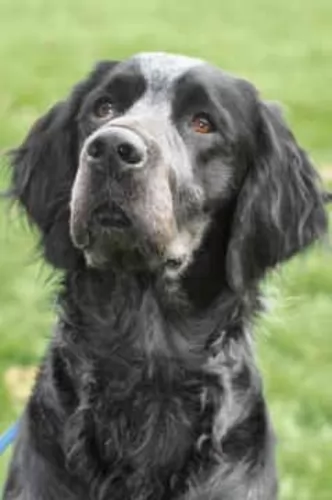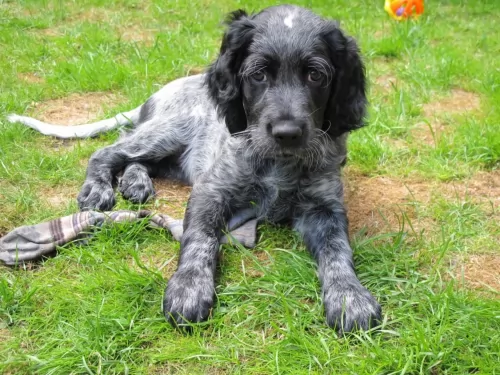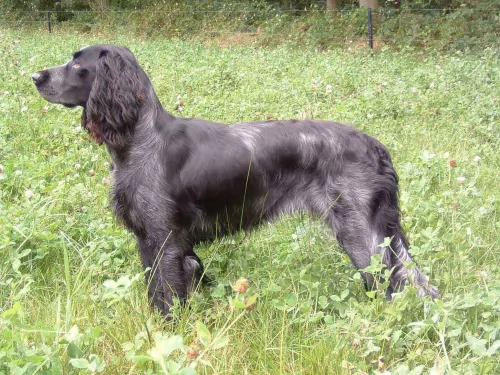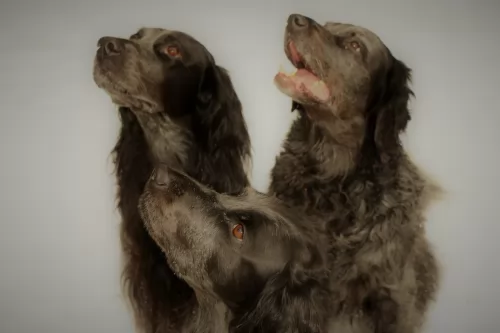 Petzlover
Petzlover Picardy Spaniel is originated from France but Welsh Corgi is originated from United Kingdom. Picardy Spaniel may grow 31 cm / 13 inches higher than Welsh Corgi. Picardy Spaniel may weigh 10 kg / 23 pounds more than Welsh Corgi. Both Picardy Spaniel and Welsh Corgi has almost same life span. Both Picardy Spaniel and Welsh Corgi has same litter size. Picardy Spaniel requires Moderate Maintenance. But Welsh Corgi requires High Maintenance
Picardy Spaniel is originated from France but Welsh Corgi is originated from United Kingdom. Picardy Spaniel may grow 31 cm / 13 inches higher than Welsh Corgi. Picardy Spaniel may weigh 10 kg / 23 pounds more than Welsh Corgi. Both Picardy Spaniel and Welsh Corgi has almost same life span. Both Picardy Spaniel and Welsh Corgi has same litter size. Picardy Spaniel requires Moderate Maintenance. But Welsh Corgi requires High Maintenance
 The Picardy Spaniel hails from France and has always been used as a gundog, having been crossed with different British hunting dogs.
The Picardy Spaniel hails from France and has always been used as a gundog, having been crossed with different British hunting dogs.
While this dog breed is related to the Blue Picardy Spaniel, the Picardy is the older of the two breeds. It has always been sought after by the French nobility for its hunting skills and the fact that its weather resistant coat allowed it to hunt in all kinds of weather conditions.
The dog’s popularity waned in the early 20th century. The UKC have recognized the Picardy Spaniel as a Gun Dog and the breed has also been accepted within the FCI as a Pointing dog group.
 The Pembroke Welsh Corgi and the Cardigan Welsh Corgi were once considered to be two types of the same breed. Today they are recognized as very different breeds, but cousins of sorts.. They are alike in many ways and very different in others. The general information in terms of height and weight above applies to the more popular and better known Pembroke Welsh Corgi, developed as a herding dog from the spitz line in Pembroke shire, Wales. The Pembroke is famous for being the breed favored since childhood by Queen Elizabeth, the current queen of England. It’s believed that the Pembroke came to the country around the 10th century with Flemish weavers. The Cardigan is thought to have come with the Norse people and be a relative of the Sedish Vallhund.
The Pembroke Welsh Corgi and the Cardigan Welsh Corgi were once considered to be two types of the same breed. Today they are recognized as very different breeds, but cousins of sorts.. They are alike in many ways and very different in others. The general information in terms of height and weight above applies to the more popular and better known Pembroke Welsh Corgi, developed as a herding dog from the spitz line in Pembroke shire, Wales. The Pembroke is famous for being the breed favored since childhood by Queen Elizabeth, the current queen of England. It’s believed that the Pembroke came to the country around the 10th century with Flemish weavers. The Cardigan is thought to have come with the Norse people and be a relative of the Sedish Vallhund.
The Cardigan Welsh Corgi, also a herding dog has their ancestry in ancient Celtic dogs. They are older than the Pembroke and hail from Cardiganshire, Wales.
Both breeds are friendly, smart and independent. Both dogs herd cattle and sheep. About the end of the 19th century, farmers in Cardiganshire began to raising sheep rather than cattle. The corgis were herding dogs for cattle. “Heelers” who avoid the cattle kicking them by nipping at the cattle’s heel. Pembrokeshore and Cardiganshire are counties in South West Wales that adjoin each other.
Then the move was made from cattle to sheep in Cardiganshire they bred their corgis with the Welsh Sheepdog where the merle color is said to come from, and the Pembroke Welsh Corgi. This caused the similarities between the two dwarf breeds. At the same time the distance grew between the two breeds and they grew into very distinct and different looking dogs. There are also some differences in their personalities.
The first corgi to appear at Crufts came in 1927 and in 1928 a Pembroke won a championship at Cardiff for the first ever corgi win. It was not until 1934 that the kennel club recognized them as separate breeds rather than a Pembroke shire type and a Cardiganshire type. From this point on the two are separate breeds with tremendous similarities. A Pem won the Reserve Best in Show at Crufts in 1955.
The first corgi came to the United States in 1933 by a breeder of Old English Sheepdogs. In 1934 the American Kennel Club (AKC) recognized Corgis as one breed with 2 types. The Pembroke has always been the more popular of the two.
 The Picardy Spaniel is larger than other spaniels. It is described as a medium sized dog, standing at 56 – 61cm in height and weighing between 20 and 25 kilograms. The body of the spaniel is squarely built and muscular body. The dog has long floppy ears and the coat which is shortish in areas except for feathering around the legs and belly can vary in colour from red to chestnut brown to sandy and chocolate. The tail is long and feathered.
The Picardy Spaniel is larger than other spaniels. It is described as a medium sized dog, standing at 56 – 61cm in height and weighing between 20 and 25 kilograms. The body of the spaniel is squarely built and muscular body. The dog has long floppy ears and the coat which is shortish in areas except for feathering around the legs and belly can vary in colour from red to chestnut brown to sandy and chocolate. The tail is long and feathered.
The Picardy Spaniel is a docile breed of dog and makes a great family pet, loving being playful with the children in the home and getting on well with other dogs. He is gentle but sociable and intelligent too and is easy to train and socialize.
Although he has been used as a hunting dog he can slot into life in the city or the countryside. He can be indoors or outdoors and still be happy, so long as his family members are close by.
He is an active dog though, and won’t be content to be sitting around for too long, loving nothing more than to be chasing a ball or going for a walk with you.
 They used to differentiate between the Cardigan and the Pembroke by saying the Cardigan was the one with the bigger ears and the Pembroke had no tail. In many parts of the world where tail docking has been banned, most Pembrokes now have tails. Only those born without don’t have them. Both dogs are long and low to the ground with big chests and short legs. This is because they are dwarfs. They are not little dogs.
They used to differentiate between the Cardigan and the Pembroke by saying the Cardigan was the one with the bigger ears and the Pembroke had no tail. In many parts of the world where tail docking has been banned, most Pembrokes now have tails. Only those born without don’t have them. Both dogs are long and low to the ground with big chests and short legs. This is because they are dwarfs. They are not little dogs.
The Cardigan Welsh Corgi is heavier boned than the Pembroke, has large rounded ears and a flowing, fox like tail. The Cardigan comes in a variety of colors but never predominately white. He is double coated with a dense, harsh outer and a soft, short and thick undercoat.
Pembroke is smaller and longer than the Cardigan with pointed ears. They are intelligent, sturdy and strong with tremendous stamina. The tail is docked in the United States or the pups are bred not to have a tail. This was originally so that the cattle could not step on their tails and injure the dogs. The double coat on the Pembroke is short and weather resistant inner coat with a longer and rougher outercoat. He has the same deep dropped chest as the Cardigan. Both corgis shed voraciously.
 The Picardy Spaniel is a docile dog who forms strong bonds with his human family.
The Picardy Spaniel is a docile dog who forms strong bonds with his human family.
He doesn’t gel easily with strangers though, but socialization and training will at least make him well behaved among strangers.
A well-mannered Picardy Spaniel is a joy in the home, and this gentle dog is guaranteed to make you the most wonderfully loyal and loving pet and companion.
 1Children friendliness For the most part they are good but can be grumpy and bossy. They are bossy personalities
1Children friendliness For the most part they are good but can be grumpy and bossy. They are bossy personalities
3.Adaptability – Very. Can live anywhere but they do need to run and they bark a lot.
4.Learning ability – incredibly smart but stubborn. Respond well to training that is reward based.
 Without any major health issues, your Picardy can reach 14 years of age and possibly even older. A couple of common dog conditions to be on the watch for include:
Without any major health issues, your Picardy can reach 14 years of age and possibly even older. A couple of common dog conditions to be on the watch for include:
Your beautiful Picardy Spaniel has floppy ears and this opens up the tendency to suffer with ear infections. The inside of the ears are moist and hot and you as the dog owner can try to keep the inside of the ear clean and dry.
He is a dog that loves water too, and swimming encourages dampness. If you prefer not to work on the inside of the ears, dog groomers or your vet can clean the ears for you. An ear infection can be painful for your pet and it will require veterinary intervention.
These are dogs which can pick up weight quite easily. Dogs which are overweight are more prone to developing cancer, diabetes and heart disease, not to mention joint problems.
Other problems to look out for include cancer, bloat, dental disease and parasites.
 • Degenerative Myelopathy – a muscular neurological disease very similar to Lou Gehrig’s Disease or ALS. It is always fatal.
• Degenerative Myelopathy – a muscular neurological disease very similar to Lou Gehrig’s Disease or ALS. It is always fatal.
• Some have cardiac issues while others may have hip dysplasia or Von Willebrand’s disease.
 Your Picardy has a thick coat which sheds and the coat should be brushed at least twice a week to prevent matting. The ears of the Picardy Spaniel require special attention. Because they are long they will need to be cleaned and kept dry otherwise an ear infection can develop.
Your Picardy has a thick coat which sheds and the coat should be brushed at least twice a week to prevent matting. The ears of the Picardy Spaniel require special attention. Because they are long they will need to be cleaned and kept dry otherwise an ear infection can develop.
At the same time, check your pet over for ticks and fleas, check his eyes, keep the nails trimmed, and check inside his mouth for rotting teeth which can be the source of many health problems if left untreated.
If you have a puppy, you will need to provide 4 bowls of food in a 24 hour period. Check on the directions provided on the food packaging to see how much to feed your puppy.
By the time your Picardy is one year of age, he can move over to 2 bowls of food a day. Only the highest quality commercially manufactured food will be good enough for your dog. Food and its quality impacts the health and longevity of your pet.
Apart from dry kibble, try and provide some home-made food, keeping it as simple as possible. Dogs thrive on simple, consistent foods. Chopped up boiled chicken, brown rice, sweet potatoes, spinach and carrots added to the kibble now and then will thrill your pet. Occasionally you can also add in some raw meat.
Avoid feeding your dog things like coffee, chocolates, popcorn, nuts and onions as all these will just upset your dog's digestive system. The secret is to keep things simple and nutritious.
Make sure your pet always has access to fresh, cool water.
 1Feeding the puppy prone to overweight, the pem needs ½ to 1 cup of small breed high quality food in 3-4 meals per day. The Cardigan needs ¾ to 1 ¼ cups of high quality small breed food in 3-4 meals per day.
1Feeding the puppy prone to overweight, the pem needs ½ to 1 cup of small breed high quality food in 3-4 meals per day. The Cardigan needs ¾ to 1 ¼ cups of high quality small breed food in 3-4 meals per day.
2.Feeding the adult – Don’t overfeed them. The Pem need 1 cup per day of high quality small breed food in 2 meals per day. The Cardigan needs 1-1 ½ cups per day in one to two meals.
They are fast, athletic dogs. Agility, CAT, Barnhunt. Herding trials, flyball and they just love backyard ball fetching. Confirmation and obedience, along with rally.